There are hundreds of eCommerce platforms available in the market. Some are designed for tech-savvy users with advanced features and customization flexibility, while others are designed with a simple user interface to set up a fully functioning eCommerce site without any technical hassle.
Beginner-friendly eCommerce platforms take care of all your technical requirements from hosting and security to payment processing, and provide the easiest tools to design your online stores.
Going forward, I’ve compiled beginner-friendly eCommerce platforms and ranked them based on ease of use, features, pricing, and more to help you choose the most suitable platform based on your technical skills and business requirements.
So, if you are ready, let’s get started with the most user-friendly platform.
1. Shopify
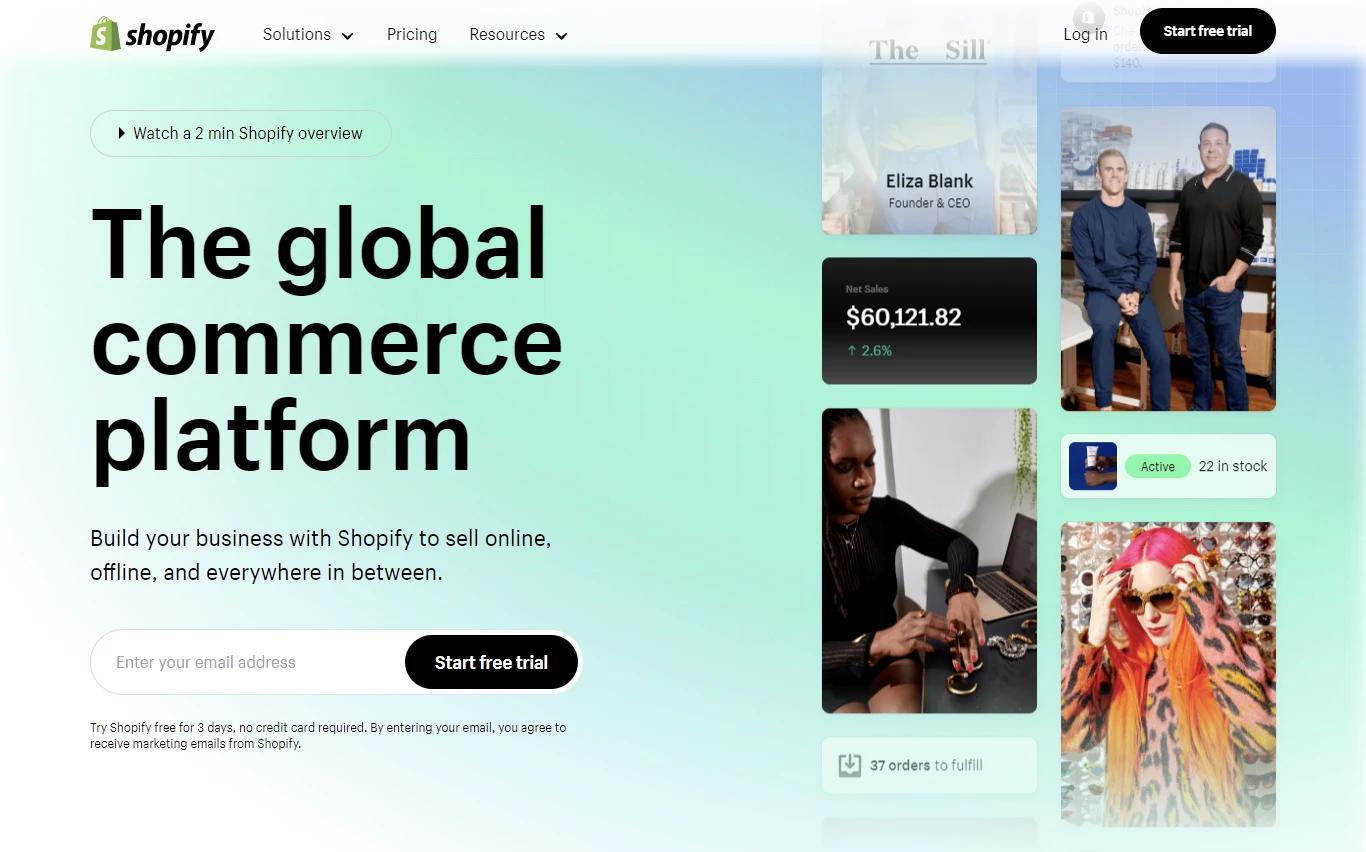
Shopify is the most beginner-friendly yet powerful eCommerce platform that provides you with everything you need to set up a storefront and grow it. It comes with an easy-to-use drag-and-drop builder, enabling you to easily customize the pre-designed templates or create new pages from scratch without writing a single line of code.
From order management and inventory tracking to sales & marketing, it is packed with advanced features and to extend its functionalities, you will have access to 3,000+ third-party apps with a 1-click installation.
It also provides direct integration with major payment gateways, both international and regional ones, including, PayPal, Stripe, Amazon Pay, etc. It enables you to offer multiple payment options to your customer and generate more sales – that is all without any technical hassle.
With Shopify, you have endless opportunities to sell any kind of product, from digital to physical products. So, whether you want to build a membership site, sell ebooks, or set up a dropshipping store, Shopify has you covered with everything.
Finally, you can refer to our Shopify Beginner’s tutorial to set up your store within a few minutes or read our detailed review to learn more about its features and capabilities.
Pros –
- Drag-and-drop builder
- Easily customizable themes
- Built-in sales and marketing tools
- Various payment methods
- Extensive app store for 3rd-party integrations
- Comprehensive knowledge base for beginners
- 24/7 customer support with technical assistance
Cons –
- Additional commission on 3rd-party payment gateways
- Might get expensive with additional apps and extensions
Pricing Plans – Shopify offers a 14-day free trial on all plans. The plans start with just $5/month for the Starter plan, which allows you to sell products through social media, emails, and other channels by sharing links to your products.
If you want to set up a website, you will need at least its Basic plan which costs $39/month, giving you access to the admin dashboard and all the essential features you need to set up a beautiful storefront.
Further reading –
2. Squarespace
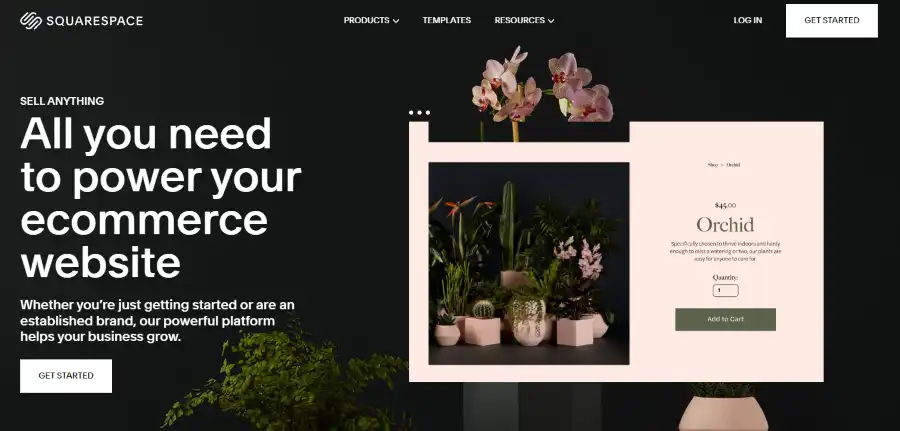
If you are a creative person looking for an eCommerce platform that lets you create a beautiful storefront, Squarespace would be the perfect choice for you. It is known for its stunning themes that you can display your products in a visually appealing manner with excellent user experience.
It comes with a drag-and-drop builder that you can use to create new pages for your store or customize the existing ones without coding, You can also select from numerous designer fonts and color palettes to make your pages visually appealing for customers.
From handling order fulfillment, shipping, and taxes to offering multiple payment options, Squarespace brings everything on a single platform to make it effortless for beginners to run an online store.
Squarespace also provides various built-in tools such as appointment booking, subscription management, and more, which allow you to sell almost any kind of product and service you want, including courses, membership, gift cards, POD, etc.
Interested? You should read our in-depth Squarespace Commerce review to learn more about it.
Pros –
- Free custom domain
- Beautiful online store templates
- Drag-and-drop page editor
- Built-in marketing tools
- Range of 3rd-party extensions for direct integration
- Mobile app for store management
- 24/7 customer support
Cons –
- Limited customization flexibility
- Limited payment gateway options
- Not ideal for large product catalog stores
Pricing Plans – Squarespace offers a 14-day free trial on all its plans, starting from $16/month. However, to get complete access to its eCommerce features, you will have to opt for its Commerce plan, starting at $27/month.
Further reading –
3. Wix eCommerce
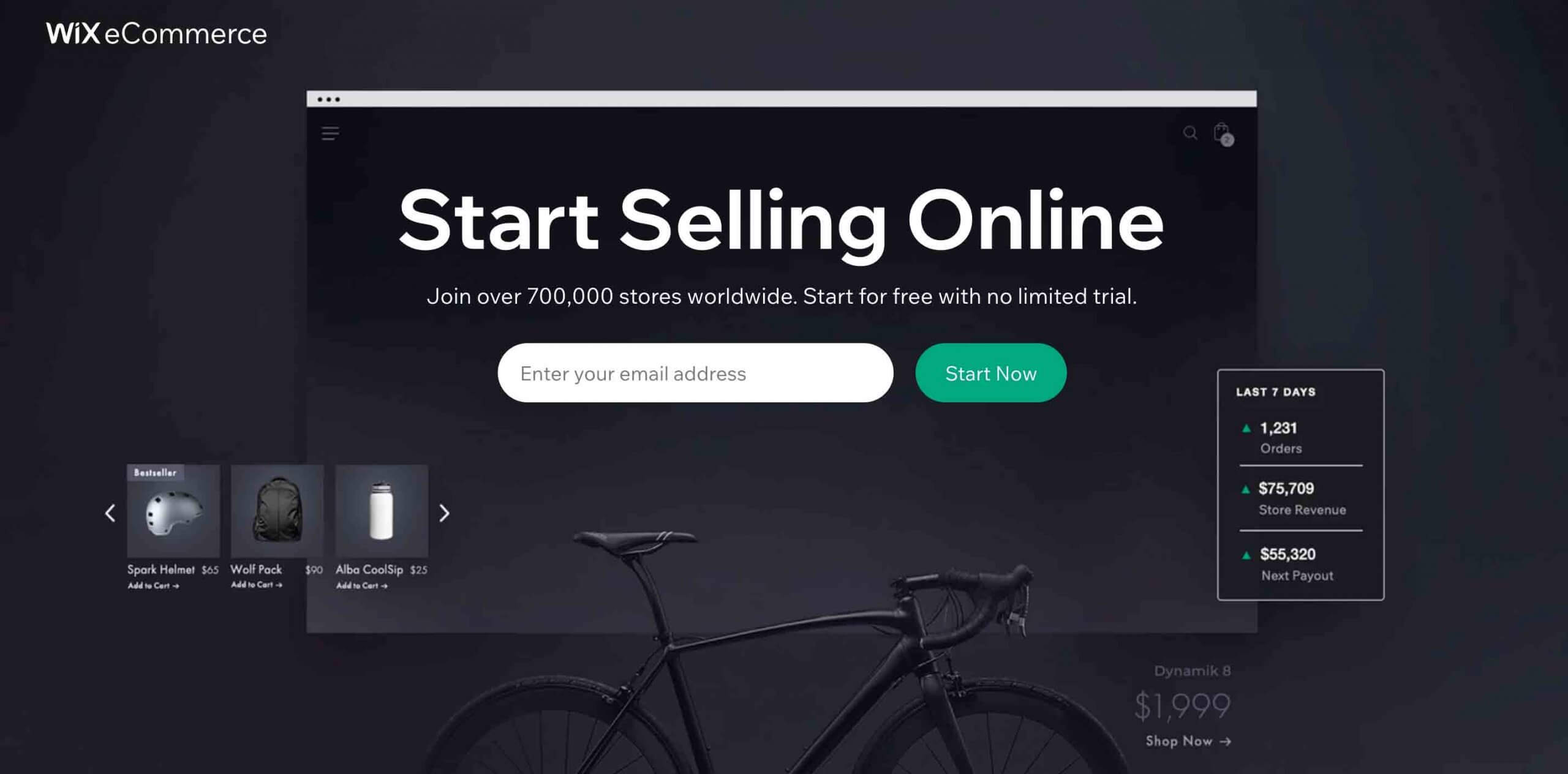
Wix is another popular website builder that lets you create an advanced eCommerce website without any technical hassle. From website hosting and security to payment processing, Wix takes care of everything in the backend and provides you with a clear user interface to build your store and manage it effortlessly,
It comes with 120+ stunning online store templates that you can easily customize using its drag-and-drop page editor. You can also choose from 50+ payment gateways to offer multiple payments and boost sales in your store.
With Wix, the sky is the limit in terms of the type of products you can sell. Whether you want to sell physical products, digital downloads, or subscriptions, Wix has got you covered with everything you need.
On the whole, if you want to set up an online store with a small product catalog and not looking for complex features, you can consider using Wix eCommerce to set up your store. You should read our detailed Wix eCommerce review to learn everything about its eCommerce features and capabilities.
Pros –
- Beginner-friendly drag-and-drop builder
- Tons of online store templates
- Wide range of supported payment gateways
- Supports multichannel sales
- Mobile apps for store management
- 24/7 customer support
Cons –
- Limited eCommerce functionalities
- Store templates cannot be changed later
Pricing Plans – Wix eCommerce has 3 paid plans with a 14-day free trial. The plan starts at $23/month, giving you access to all the essential features, For dropshipping, you will have to opt for higher plans costing $27/month and $49/month, respectively.
Further reading –
4. WooCommerce
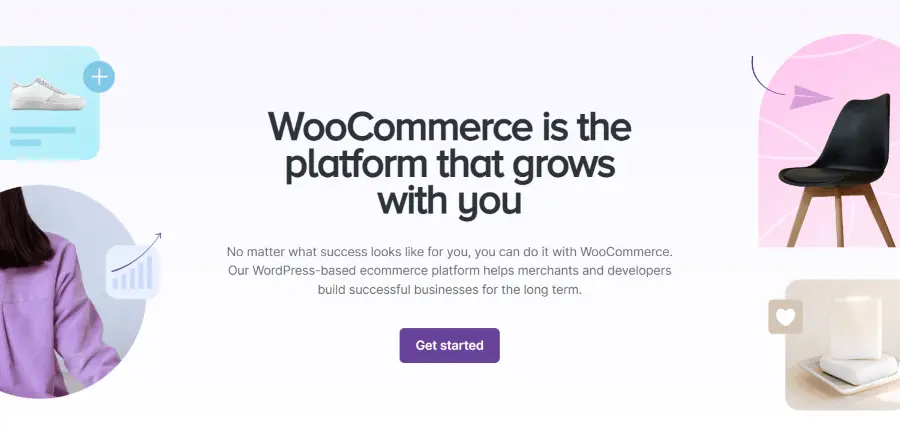
WooCommerce is probably the only free eCommerce platform for beginners that is easy to use and gives you complete control over your store design and features. WooCommerce is an open-source WordPress plugin that adds eCommerce functionalities and enables you to sell anything from your website.
So, if you are handy with WordPress, creating an eCommerce website with WooCommerce won’t be a challenge for you. There are tons of WooCommerce themes that you can easily customize and set up your store within minutes, but if you want to add custom features to your store, you will require at least basic website development and coding skills.
Since WooCommerce is open-source software, you will have an active community of developers to help you with your challenges in designing and development. In fact, you will have access to thousands of free and paid plugins that you can use to add features and functionalities to your store.
Pros –
- Free forever
- Highly customizable
- Thousands of free & paid customizable themes
- Access to a range of free & paid plugins
- Extensive range of supported payment gateways
Cons –
- Can be costly if premium plugins are used
- Required basic web development skills
- No customer support, only community-based support
Pricing Plans – WooCommerce is free to use, but you will have to invest in hosting services and plugins to set up your store.
Further Reading –
- Beginner’s tutorial to create WooCommerce online store
- Best WooCommerce hosting providers
- Must-have WooCommerce plugins for online stores
5. Ecwid
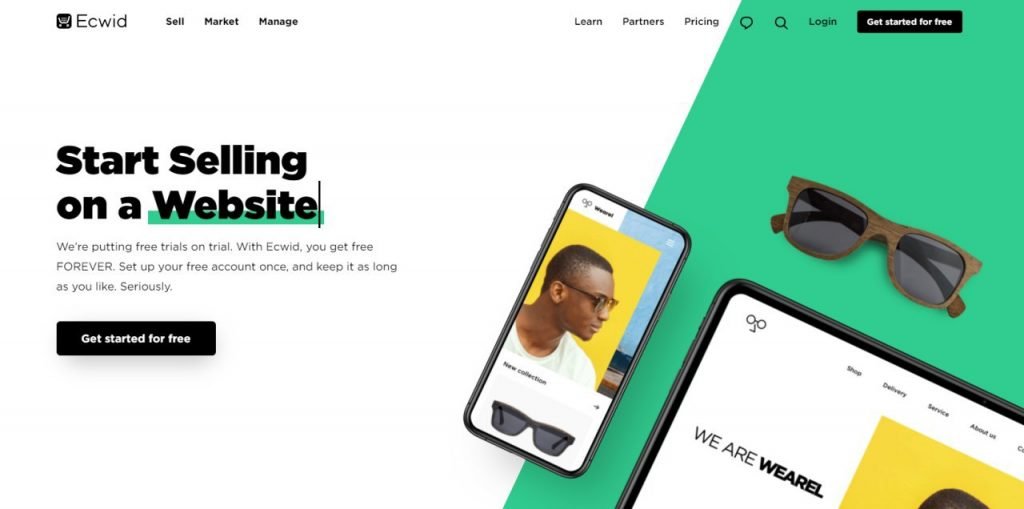
Ecwid is a dedicated eCommerce platform for beginners and small businesses. With a simple user interface and customizable options, Ecwid makes it effortless to set up a fully functioning online store within minutes.
It allows you to connect your store to other websites, and sell on Facebook, Amazon, and other marketplaces with a centralized order management system on Ecwid’s dashboard. It even provides direct integration with Facebook Ads, Google Shopping, Pinterest, and other advertising channels to help you manage and track your ad campaigns from a single dashboard.
Overall, Ecwid doesn’t require any technical knowledge or design expertise to create a storefront. It lets you sell both physical and digital products and enables you to acquire more customers via other sales channels, with simple integrations.
Pros –
- Free forever plan
- No Transaction Fees
- Easy-to-use interface
- Built-in multi-channel sales solution
- Android and iOS apps for store management
- Seamless integration with major CMS platforms
- Range of extensions in the App market
Cons –
- Limited customization options
- Unlimited products are allowed only in the highest plan
- Limited payment options
Pricing Plans – Ecwid has a free plan that allows up to 5 physical products. The paid plans start at $19/month, allowing up to 100 products and access to its marketing and multichannel sales features.
Further Reading –
6. Square Online

If you are already using the Square payment processor for your offline stores, Square online would be the best eCommerce platform to take your business online.
It is built over Weebly, a popular website builder, which makes it super easy to use and you can readily set up your online store within minutes. The best part is that by connecting your Square POS, you can keep your inventory in sync to avoid overselling and provide a seamless shopping experience to customers.
Square Online lets you connect your store to Facebook Shop and Google Shopping to extend your reach across platforms and drive more sales. It even lets you schedule product drops, and create flash sales and pop-ups to encourage customers to shop more.
Bottom line? If you are planning to take your offline business online but lack the technical skills to set up an online store, Square Online would be an ideal platform for you to get started.
Pros –
- Free forever plan available
- Free custom domain
- Simple and easy-to-use interface
- Multiple payment methods
- Built-in Afterpay for buy now, pay later feature
- Numerous sales and marketing features
Cons –
- Basic eCommerce features
- Not much customization flexibility
- High transaction fees
Pricing Plans – Square Online has a free plan that gives you access to all the essential features to set up an online store with limited customization options. The paid plans, starting at $29/month give you access to more advanced features and customization options.
7. Sellfy
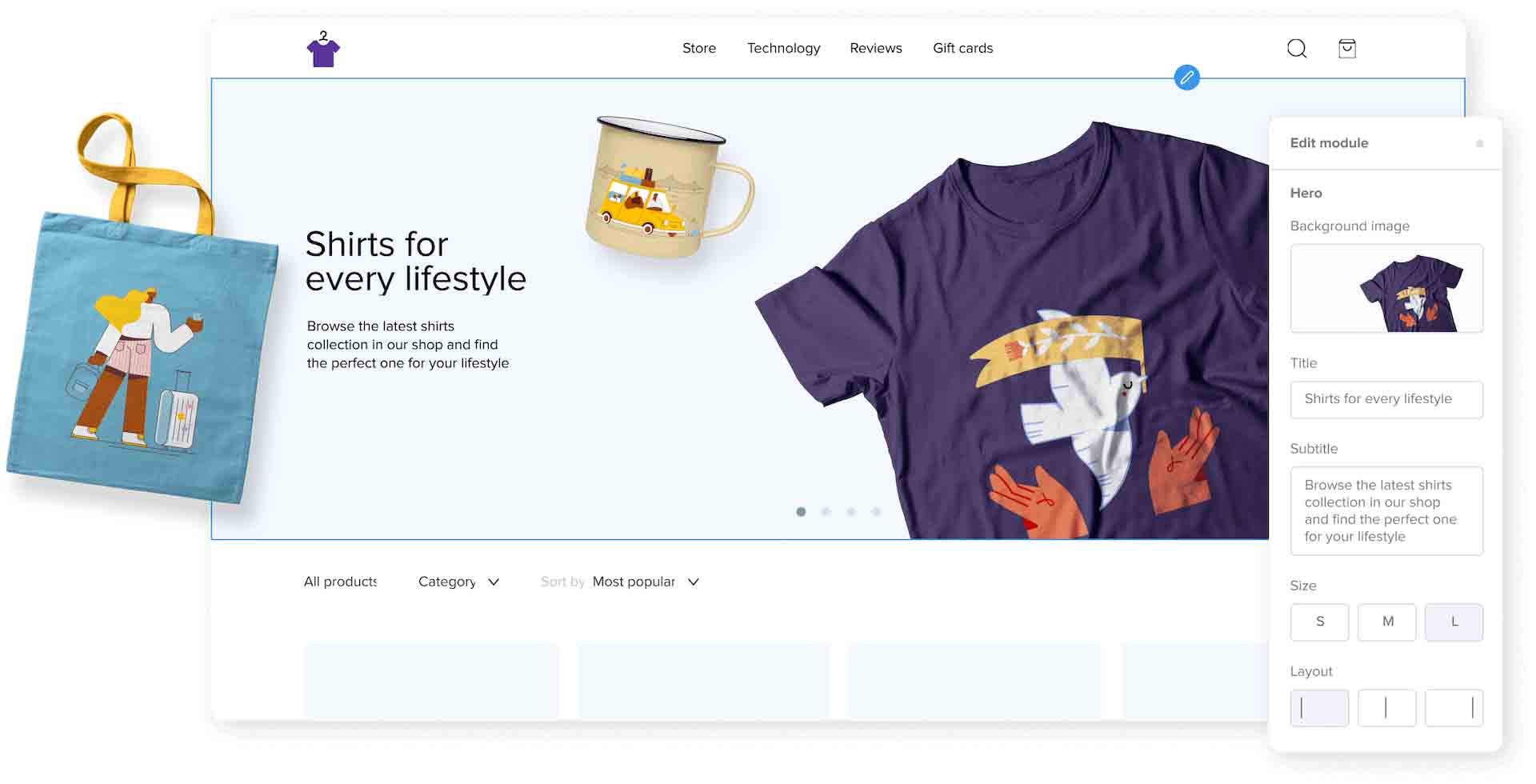
Sellfy is another beginner-friendly eCommerce platform that lets you create an online store within minutes. On this platform, you can sell both physical and digital products, but it is best known for selling digital downloads like eBooks, videos, photographs, membership, and more.
Without requiring any coding or designing skills, Sellfy enables you to set up a fully functioning storefront with multiple payment options and a built-in email marketing tool. It also provides high-level security measures such as pdf-stamping and SSL encryption to protect your digital products from piracy.
All-in-all, if you are looking for an easy-to-use eCommerce platform to sell your digital products, you should consider Sellfy. If you want to get a complete overview of the platform, read our detailed Sellfy review to learn more.
Pros –
- Easy-to-use platform
- 0% transaction fees
- Built-in marketing tools
- Built-in VAT & tax settings
- 24.7 customer support via email
Cons –
- Limited customization options
- Limited Integration options
- Only two payment processors are available
Pricing Plans – Sellfy has 3 paid plans, starting at $29/month with access to all essential features and limiting annual sales to $10,000. Once you exceed the sales limit, the plan will be automatically upgraded to the next higher plan.
Which is the easiest eCommerce platform for you?
If you are a beginner who wants to set up an online store by yourself, choosing the right eCommerce platform is crucial. After conducting extensive research and analysis, I have identified these platforms that stand out in terms of user-friendliness, affordability, and scalability.
Shopify is the best option in every aspect, while Squarespace and Wix are excellent options for beginners to build a professional online store without extensive technical knowledge or coding skills.
However, the final decision should be based on your individual skills and business requirements. So, carefully evaluate the features, pricing, and support options to choose the most suitable platform from the above-listed ones.
I hope this article helped you find the easiest eCommerce platform for you to step into the eCommerce space. Now, if you want to explore more options based on your niche, here are a few lists that you might want to check next –



